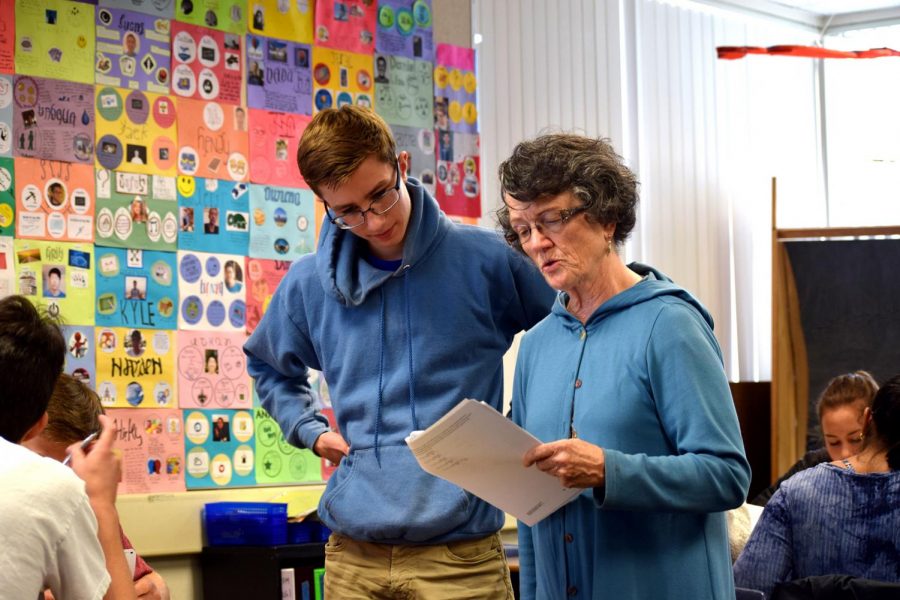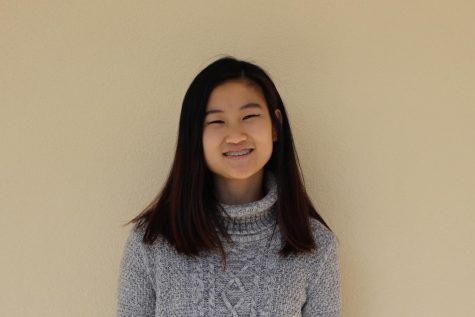Thank You Ms. Evans; We’ll Miss You
After 15 years reshaping the math department, math teacher Carol Evans will leave a lasting legacy with her distinct teaching philosophy.
Math teacher Carol Evans helps senior Yann Sartori with test corrections. Known for her sharp wit and tough love, Evans worked to instill a love of learning in her students by prioritizing process over product. Francesca Fallow.
April 24, 2018
Carol Evans believes in you. That’s the main thing students remember — it’s why they cite being in her classroom as a once-in-a-lifetime experience. Stepping in her classroom forces them to become the best versions of themselves, not because her classes are so difficult, but because she only accepts honest effort. And it’s because Evans treats education as a process of discovery, one where the only thing that matters is genuine learning.
“She pushes you,” Ryan Wu, ‘15, said. He had Evans for three years. “That’s the biggest thing. She’s not willing to let you take the easy way out, not willing to let you copy the answer. Everything she does revolves around you taking the ownership over your own answers.”
This is why Evans will be so missed when she retires at the end of the school year. After 15 years at Los Altos encouraging students to challenge themselves, Evans, who teaches AP Statistics and AP Calculus BC this year, is leaving to spend more time with her husband. Her legacy — providing students the tools to solve problems and letting students piece together solutions without holding their hands — has marked her students for success and left Los Altos with a pedagogical model.
“Even when I didn’t believe in me, she believed in me,” Bianca Champenois, ‘16, said. “Whenever I was deciding between Algebra 2 or Algebra 2 Honors or Calculus AB or Calculus BC, she would always push me towards the harder one. And it always worked.”
Evans tells students her job is to make herself “redundant,” and a lot of her teaching philosophy goes into creating that redundancy — she teaches problem-solving by facilitating classes instead of lecturing them. She tells students to ask at least three classmates before going to her. When guiding students through problems, she finds the right questions to lead them toward a better understanding of the material in a way that Ryan calls “masterful.”
“If you teach people and not material, it’s never the same,” Evans said. “I enjoy figuring out how people think, figuring out how I can structure [a problem] to help a student say ‘Oh, I got it.’ And [that] differs from student to student.”
Beyond teaching students to be independent learners, students know Evans as a conversationalist. In discussions Ryan calls “Evans conversations,” she nonchalantly chats with students as they review homework or work on problems, asking about extracurriculars and college while giving advice.
Sophomore Alex Siesel, who has Evans for AP Calculus BC this year, says Evans’ classes teach “more life lessons than math concepts.” Many students aren’t surprised when they’ve suddenly learned to problem-solve, or picked up a new study tip from 10 minutes of small talk. They often end up spending an entire lunch engrossed in conversation.
Evans structures her classes for self-learning, but two constants always remain: daily review and collaboration. Each day, students take a daily quiz, then discuss last night’s homework — which few people fully understand — all with little guidance. Evans circles classrooms facilitating and answering questions in an effort to guide group discussions. It’s not about right or wrong answers, but about helping students as they circle closer to a better understanding of the material.
“I don’t do a lot of direct teaching — I don’t stand up and lecture a lot,” Evans said. “[Some] people didn’t learn math like that. They wanted it the way they had it: you write problems on the board, and then you write the same problems on the test with [different numbers]. But nobody learns math that way.”
Evans’ emphasis on active problem-solving extends to the way she approaches reviewing homework in class. She encourages students to write up solutions on the board, even if they’re wrong, and encourages other students to catch “board-o’s,” her term for mistakes in solutions. She wants the students to learn to teach themselves, not regurgitate formulas — an innate part of her class is encouraging collaboration.
Other math teachers look to Evans’ unique class philosophy as a model. Math teacher Adam Anderson, who has taught many courses alongside Evans, has realized the need to redesign and adapt his curriculum each year to respond to problems and integrate newer educational theory.
“She has taught me more about being a good teacher than anyone, including the teacher preparatory classes I took at UC Santa Barbara,” Anderson said.
Her teaching style is also informed by research, which lets her grow her curriculum every year. Rather than keeping the old curriculum, if research shows that a certain style works, Evans will take the initiative to change the old curriculum — she still sees herself learning how to teach.
“What I will miss is how she decides to do things research-based,” math department coordinator Laraine Ignacio said. “She’s like ‘Hey, there’s this cool article, [you] should read it’ and then she’ll then revamp [curriculum] even if it means a lot of work. Her energy is boundless.”
While Evans will miss the job, she says she won’t miss “monitoring for cheating.” Nor will she miss grade-centered motivation rather than a genuine desire to learn.
“I get tired of [students] spending an hour trying to correct two points on a quiz while they could have spent that hour trying to learn material,” Evans said. “That two points on the quiz affects the third decimal of the grade. They could have spent an hour and worked on things that helped their understanding.”
To Evans, teachers can only encourage and instill a genuine desire to learn if they have a similar perspective and teach that way — students catch on to teachers who aren’t passionate about what they teach and only care about the end result, not the process. And as she says, it’s the process that matters most.
“If you can’t think, you can’t be a good citizen, so I’ll teach you how to think,” Evans said. “We don’t want to raise robots. We don’t want to raise buggy versions of Excel. We want to raise thinkers.”
Evans’ goal is to give students the tools — the wrenches, screwdrivers and hammers — and watch them build something great.
“The tools are the most important thing I have ever learned about in life,” Ryan said. “They just stick with you.”




